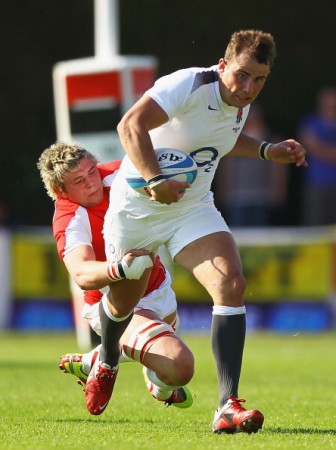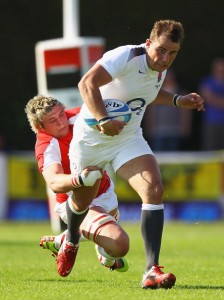
Dai Foreigner: The issue of whether Pretorius (right) and Kohn should be allowed to play for Wales is a divisive issue
By Paul Williams
The ‘non’ Welsh in the Welsh squad
JANUARY SAW Olly Kohn and Andries Pretorius named in Wales’ Six Nations squad. Despite having their hand forced by numerous injuries to key back-row and second-row forwards, both Pretorius’ and Kohn’s selection has left the Welsh selectors, and supporters, in a tricky position. Recently Scotland and England have been criticised for picking ‘Johnny Foreigner’, and now Wales has followed suit and brought ‘Dai Foreigner’ into their ranks. It is worth noting that whilst Kohn’s selection has received the most attention, it is Pretorius who is on thinner ice for purists – Kohn’s grandfather is from the Rhymney Valley, whereas Pretorius has qualified through the contentious residency rule. Either way, the selections have lowered Wales’ pedestal a couple of notches. Of course Wales hasn’t always been squeaky clean when it’s come to selecting overseas internationals. There was a period in the late 90’s where Welsh rugby had unearthed more dubious grandparents than a researcher on ‘Who Do You Think You Are’. There are even those who currently argue that Jon Davies and Ian Evans aren’t truly Welsh having not been born in Wales. This is of course a flawed argument and by no means comparable to England’s selection of Thomas Waldrom and Mouritz Botha, Ireland capping Richardt Strauss or Scotland capping Sean Maitland, just months after touching down. But in selecting Kohn and Pretorius, many in the principality will see Wales’ actions as ‘not cricket’ – which is ironic given a good proportion of the English cricket team were born in South Africa!
WRU drop ticket prices for Six Nations 2014
This week the WRU announced they were cutting the price of tickets for next year’s Six Nations fixtures. It was a timely announcement. The cost of international tickets has been a talking point for the last five seasons and had reached a crescendo in the last fortnight. Tickets to watch Italy in 2014 have been cut by 18%, tickets to watch Scotland have been reduced by 12.5% whilst seats for the French game have been frozen. However, whilst the ticket price reductions were a welcome act of goodwill from the WRU, the lukewarm reception to it points to a different problem. Every single Welsh fan would swap the financial savings on offer for an 18% increase in line breaks, a 12.5% increase in clean lineout-ball and a freeze on dropped restart possession. It’s not the price that’s the problem, it’s the product.
The LV= Cup is vital for the regions
The LV= Cup is often derided as a competition. The coverage is patchy, broadcasters seem disinterested and so do the supporters. Yet the LV= Cup is arguably the most important competition for the future of the regions in Wales. The Regions are widely accepted to be on their uppers and the promotion of development players is the only means of refreshing squads which are being continually harvested by moneyed French and English teams. And herein lies the problem. Whilst the Welsh Premiership is an entertaining league, the gap in quality between it and the RaboDirect Pro12 is significant – this is why the LV= Cup is so beneficial for the regions. If an English team wins the Cup they automatically qualify for the Heineken Cup, whereas the Welsh teams can’t. Whilst this seems an inequality, it can work in the regions’ favour. It means that the English clubs regularly field strong teams with an eye on Europe, whilst the Welsh regions can use it as a risk-free developmental tool against the quality of opposition that can’t be found in the Welsh Premiership. The LV= may seem like a pointless trophy, but in the long term it could help the regions build squads that can genuinely compete for silverware.
Wales could become the Holland of rugby
There was a time when Dutch clubs dominated European football. Ajax and Feyenoord were major players in Europe until the mid 1990’s – when an influx of money into certain European leagues, namely the English Premiership, skewed the natural equilibrium. The result was that a once successful nation of clubs, whilst still retaining a competitive national team, became a feeder league for the big boys in England, Spain, Germany and Italy. Regional rugby in Wales currently faces the same fate. French money has already distorted the player pool enormously. The next four seasons will see the English clubs pull further away as BT’s coffers are emptied into England’s Premiership. You can already see some of England’s top clubs splashing their future earnings – January saw Saracens and Northampton both making high profile signings. The undoubted and necessary changes to the Heineken Cup will affect the Welsh regions even further with a more competitive qualification system sure to rule out all but the two most competitive Welsh regions – and therefore the revenue streams. Another month has passed in regional rugby without any hint of immediate and sustainable action. Without it the Welsh regions soon won’t have the cash to compete and could well end up ‘going `Dutch’.
January did have its positives
Obviously January wasn’t a joyous month for Welsh rugby. The regions were dumped out of all European competitions. Rumours of a further player exodus persists and a solution to the regional crisis still seems to be at the talking rather than the doing stage. However the performances of some of the regions’ next generation of players was heartening. Sam Davies and Tom Habberfield (Ospreys), Owen Williams (Llanelli RFC), Ellis Jenkins (Cardiff RFC), Dan Thomas (Llanelli RFC) and Owen Williams (Blues) have all impressed – I have deliberately left Rhys Patchell out of this list as he already seems beyond being tagged as a development player. However the most impressive of the crop has been Ieuan Jones of the Dragons. Jones already has the skillset required by a senior international, yet he is still part of the Welsh U20s. His performances at No 8 have impressed everyone at Rodney Parade – and let’s not forget, this is a club that has become accustomed to standards set by one of the world’s best, Toby Faletau.
Follow Paul Williams on Twitter @thepaulwilliams








